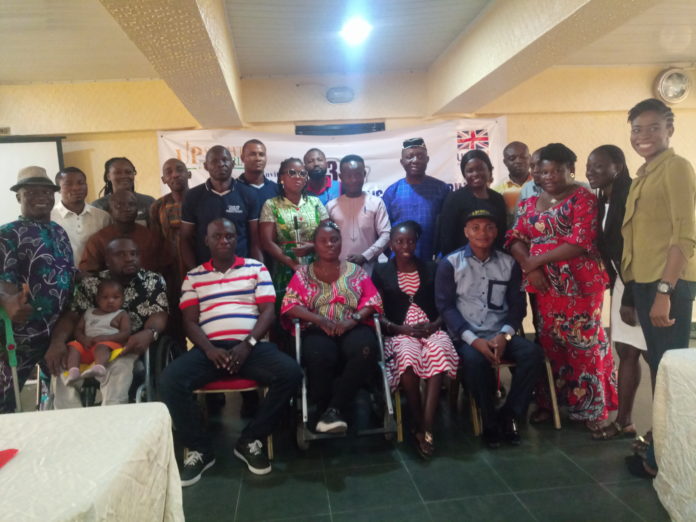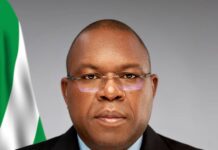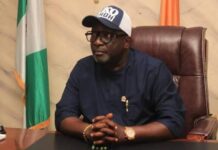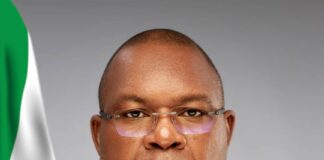By Abasifreke Effiong
Persons With Disabilities (PWDs) in Akwa Ibom state have called on the federal and state government to show more commitment to the implementation of the
Discrimination Against Persons With Disabilities (Prohibition) Act 2018.
PWDs in the state said they want the federal government to set up a commission for persons with disabilities, while calling on the Akwa Ibom state government to urgently reconsider the physically challenged persons protection against discrimination Bill which was denied assent by Governor Udom Emmanuel.
At a-three day capacity training in Uyo, on the use of Freedom of Information (FOI) and the Nigerian disability Act, PWDs in the state said government at the federal and state levels have not should sufficient commitment to end discrimination against disabled persons.
READ ALSO : Rivers state police command imposes N30,000 ‘administrative charge’ on persons seeking police protection
The training which was organised by the Centre for Citizens With Disabilities under its Upright4Nigeria campaign was attended by participants from different clusters of PWDs in the state.
A cross-section of the PWDs, some of whom who spoke through sign language interpreters said they were worried that one year after the enactment of the Disability Law, actions have not been taken to end discrimination against PWDs.
“We are still being discriminated against by persons and institutions. The attitude of health workers towards persons with disabilities has not changed.
“You go to the bank and wants to write to the staff what services you want as a deaf person, you will be told ‘talk! talk! talk! Can’t you talk?’. This is offensive to the deaf”, a member of the association of the deaf in the state said through a sign language interpreter.
The Secretary, Joint Association of Persons With Disabilities, JONAPWD, in Akwa Ibom state, Mr. Akaninyene Isidore, said discrimination against PWDs has subsist because government has not shown sufficient commitment to the Disability Act.
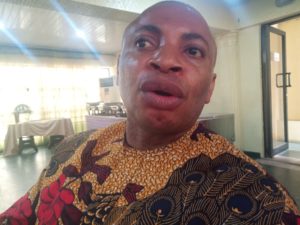 Mr. Akaninyene Isidore, Secretary, JONAPWD, Akwa Ibom state at the CCD capacity training in Uyo.
Mr. Akaninyene Isidore, Secretary, JONAPWD, Akwa Ibom state at the CCD capacity training in Uyo.
“I can’t say that government has shown enough commitment as far as discrimination against persons with disability Act is concerned. But, I want to commend the government of President Muhammadu Buhari for taking into consideration the plight of persons with disabilities by signing the Disability Bill into law. Today we want the federal and the state government to take steps to implement the Act.
“We want the establishment of a Commission for persons with disabilities. It is pertinent that this commission be put in place to oversee the affairs of persons with disabilities and drive the social inclusion which the Disability Act stands for.”
Isidore said it was pathetic that the effort of JONAPWD and the sixth Akwa Ibom House of Assembly to get a law to protect persons with disabilities in th state was thwarted by the executive.
The Akwa Ibom state House of Assembly passed the physically challenged persons protection against discrimination Bill but Governor Udom Emmanuel withheld assent to the Bill.
In his contributions, the public relations officer of the National Association of the Blind, Mr. Ubong Udo, lauded Centre for Citizens with Disabilities and her partners for organising the training.
He said the Disability Act will be “a game-changer” for persons with disabilities when implemented.
Udo urged PWDs to be actively involved in the campaign for the implementation of the Disability Act as well as the provision of a law to protect persons with disabilities in Akwa Ibom state.
“The (federal) government has passed the law, now it is for persons with disabilities to demand for its implementation. When you look at the law, it provides a five year transitory period, so one year is gone, we are left with four years, what steps has the federal government taken to set up the disability commission? So PWDs should actively seek the implementation of the Disability Act.”
READ ALSO : We will work to end female genital mutilation in Africa – Teennation
Explaining the need for a law to protect PWDs in Akwa Ibom state, Ubong Udo said PWDs are not enjoying the right to education as provided for in chapter four of the 1999 constitution as amended.
“When the constitution says in chapter four that every Nigerian has the right to education, do PWDs have the right to education? My answer will be, No. If I go to the primary school in my community, the headmaster will tell me there is no facility for blind persons.”
“So at that level there is discrimination in access to education. We need a law to protect our own right to education in Akwa Ibom state. We are first seen as Akwa Ibom people before persons with disabilities, so we should also enjoy the rights other indigenes of the state are enjoying.”
Udo said if government fails to guarantee the rights of PWDs to education, it should be prepared to take care of all persons with disabilities, stressing that no blind person
will beg on the street if he has access to education.
Topic discussed at the training were, “The use of FOI Act to demand accountability from state actors”, “Discrimination against Persons With Disabilities (Prohibition) Act 2018”, “Introduction to budgeting and budget basics”, and “Link between FOI and Discrimination against Persons With Disabilities (Prohibition) Act 2018.”
Speaking on the FOI Act, the lead facilitator at the workshop, Professor T. A. Badaiki, said the training was to empower PWDs to use the FOI to get information and interrogate issues of governance.
“Nigerian institutions do not want the citizens to be informed. But the FOI came as an instrument so that we would not perish in ignorance. You can’t say you are participating in governance without information. The FOI provides you opportunity to get information on how you are governed.”
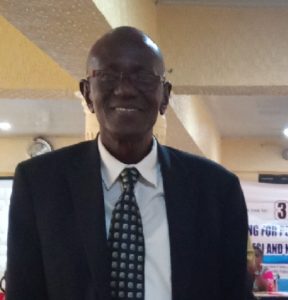 Prof. Badaiki.
Prof. Badaiki.
Badaiki who is a lecturer of Law at Ambrose Ali Univeristy, Edo state, encouraged PWDs to use the FOI Act to demand accountability and transparency from government.
Speaking on the Disability Act, Mr. Tunde Salman, Convener, Good Governance Team Nigeria, said the training was to get PWDs acquainted with the provisions of the Discrimination Against Persons With Disabilities (Prohibition) Act 2018 and how they can apply it.
Salman, a gender and social inclusion advocate said PWDs should be able to use the Disability Act to surmount barriers of access to social services.
In his remark, the Executive Director, Centre for Citizens with Disabilities (CCD), Mr. David Anyaele said the training was to afford PWDs new strategy for an all-inclusive approach to fighting corruption.
Anyaele urged participants at the workshop to share the knowledge they acquire at the training with members of their respective clusters.
He said the training was supported by Actionaid Nigeria through UKaid funded project on Strengthening Citizens Resistance Against the Prevalence of Corruption (SCRAP-C), aimed to contribute to reduction of corruption through changing public attitude.
Centre for Citizens with Disabilities (CCD), is a premier organisation of, and for persons with disabilities working to promote disability rights, inclusion and participation of PWDs in development agenda.
Read similar story where PWDs urge Governor Emmanuel to sign Disability Bill
The training featured exercises on writing FOI requests.



